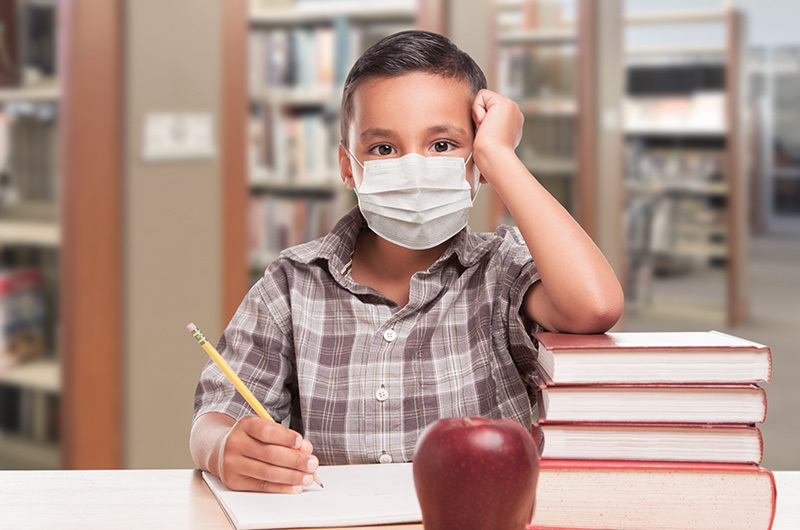Preparing your kids for the new school year during COVID-19

This back-to-school season is shaping up to be unlike any before. As kids, parents, teachers, and schools approach the start of a new school year, there are still many questions about exactly what school might look like in the midst of the COVID-19 pandemic.
With so many questions around school reopening, many parents don’t know how to prepare their kids for the upcoming year. For guidance, we turned to Erica Lee and Heather Potts, psychologists in the Department of Psychiatry at Boston Children’s Hospital.
How can parents help kids deal with the uncertainty around the coming school year?
Heather Potts: We’re all living in this time where we really don’t know what’s going to happen next week or next month, so we need to help kids understand that while there might be a plan for going back to school, we can be flexible. While we might expect and really hope for one thing, such as going back to their classroom, it might not happen — and that’s okay. Parents can use this moment to teach and model how to be flexible and use coping strategies for stress and times of uncertainty.
Erica Lee: Sitting with uncertainty is stressful for everyone. But research shows that trying to fight uncertainty actually makes it worse. Instead, being able to accept situations as they are allows people to also accept the emotions that come with those situations, and then to cope with them. So while it’s hard to tell your kids that you don’t know what will happen, it’s okay to be realistic with them. You can help them focus on the things they can control, such as how to wear a mask correctly and proper handwashing, rather than the list of things they can’t possibly know or control.
How do you plan for what might happen once kids get to school?
Lee: Kids feel reassured when they know what plans are in place and what changes to expect. Every school district is making their own plans for how to open safely, so find out what the plan is for your school and then talk with your kids about what might be different. What will the classroom look like? What will lunch and recess be like? What extracurricular activities or clubs will your child have or not have? How will they access extra supports, like tutoring or counseling? Walking through the specifics can give your kids something concrete to hold onto.
Potts: Practicing different scenarios ahead of time is a good way to give kids a sense a control. And letting them know they can play an active role in the safety and well-being of everyone at school gives them something tangible they can do in a time of so much uncertainty.
How can parents help prepare their kids for going back to a classroom?
Lee: We’re at the point where many school districts are still putting out tentative plans, because everyone is adjusting to the pandemic happening in real time. Try to stay in regular contact with your school to learn what they are doing. Then you can walk through these scenarios with your kids and discuss their questions and concerns. The Centers for Disease Control and Prevention (CDC) offers a School Decision-Making Tool for Parents, Caregivers, and Guardians as well as Back To School Checklists for parents who have questions about returning to school.
Potts: There are also some proactive things parents can start doing even if schools haven’t yet created a more formal plan. For example, you can help your kids understand the importance of social distancing and wearing masks. Then you can help them practice these skills before school starts, and talk about how it will work in school. For example, even though they may not be able to run up and hug their friends or teachers, they can use a different, fun greeting.
Lee: And for younger kids who struggle with wearing masks, help them feel more comfortable with the idea by making it into a fun game. One idea is to say, “Your mask gives you superpowers, so you want to make sure to keep it on all the time. And if you touch your face or touch someone else, that reduces your power.”
Potts: You’ll also want to talk to your kids about what to do if they don’t feel safe or other kids aren’t following the rules. They should know that they can talk to the teacher or tell you if that happens.
How do you help kids cope with the stress of going back to school?
Lee: If your child is returning to school, help them think about the positives of going back, especially if they’re feeling anxious. For example, if your child will be spending time in the classroom, they can look forward to seeing their teachers and friends again and getting to do some activities together. That can be comforting to kids amidst the uncertainty.
Potts: And if you’re homeschooling or doing online learning, you can focus on the positives of that, such as having extra time together, or being able to have lunch or take a walk together mid-day. Focusing on the positive of whatever reality we’re living in is a powerful way to cope with stress
What expectations should parents have around academics?
Lee: Try to be flexible and forgiving with your children and yourselves. This year is going to be harder for everyone: kids, parents, teachers, and schools. The goals we want to achieve may change as the year passes. Most kids will need additional support to help them learn how to structure their time, make to-do lists, break down tasks, get their work in on time, and communicate with their teachers if they are having a difficult time in any area.
Potts: It’s also important to speak up if your child is struggling. Don’t be shy to ask for help, whether it’s from another parent, a teacher, special education teacher, counselor, or your school. There are also a lot of great resources online to help parents with school struggles, including the American Academy of Pediatrics and CHADD, which is for kids who have attention deficit hyperactivity disorder (ADHD).
How can parents help kids deal with a shift in school plans mid-year?
Potts: Kids are actually adjusting to this, just as we all are. They are resilient by nature, but parents can model that resilience too. Being flexible, adapting to change, and focusing on the positive are all important life skills to have, and COVID-19 is a great teaching moment for developing those skills.
Lee: Parents can tell their kids, “If anything changes, we will work as a team to come up with a new plan. We will figure out together how to keep you safe, but also how to keep you learning and connecting with other people.”
Learn more about Boston Children’s response to COVID-19.
Related Posts :
-

Why parents really need to talk to their children about the news
These are strange, anxiety-provoking times. That’s true no matter where one lives or where one sits on the political ...
-

Taming vaccine data: Joann Arce, PhD
Part of an ongoing series profiling researchers at Boston Children’s Hospital. Joann Arce, PhD, is a data tamer — corralling ...
-

Immune biomarkers predicted COVID-19 severity and could help in future pandemics
Why did some people fall critically ill from COVID-19 and others not? In May 2020, as COVID-19 swept the world, Boston ...
-

Deep plasma proteomics: Back to the future
Blood plasma is collected from people routinely during clinical care and for research. It is potentially a rich source of ...





